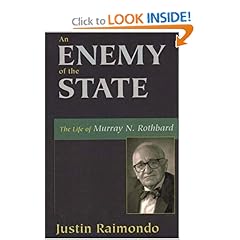 I finished this book, finally, and am not sure I can do it justice. As you may have noticed when I mentioned it before, it is the kind of book that has a lot of personal connection to me that might not apply to anyone else. Still, here is my attempt.
I finished this book, finally, and am not sure I can do it justice. As you may have noticed when I mentioned it before, it is the kind of book that has a lot of personal connection to me that might not apply to anyone else. Still, here is my attempt.
An Enemy of the State was written by one of my favorite political columnists, and it is the most fun I have had in awhile.
Not a teen anarchist who never grew up.
One of the big surprises to me was how long it took for Rothbard to embrace anarchism. I had assumed that he had reacted to the marxism of his family and become an anarcho-capitalist as a teenager.
But, for one thing, I was wrong about one aspect of Rothbard’s upbringing: his father was very much a pro-American supporter of the free market. They remained close while his father was alive. And Murray himself was an active participant in the “old right” movement to promote free markets and to oppose foreign interventionism. Even in grad school he had not yet become the radical libertarian he is now known as (for better or worse).
It used to be worse.
With the Democrat hegemony currently in place, many who grew up during the Reagan victories are tempted to think things are as bad as they could be. This was a good time, therefore, to read Rothbard’s biography. He had a much more hostile environment to deal with from the New Deal to World War II to the Cold War and the Great Society, the pro-peace, pro-freedom principles of the Old Right was increasingly isolated, ignored, and mocked by virtually everyone.
It was especially hard for Rothbard to see old allies who had opposed American involvement in WWII suddenly get on board the National Review band wagon in favor of nuclear war with Russia. He saw virtually all the remnants of the anti-war conservatives completely subverted to support the rising welfare-warfare state.
The fact that Rothbard continued to be optimistic and keep looking for strategic avenues to communicate his vision is nothing less than inspiring.
Reaching out to the New Left not a Productive Strategy
I first heard of Rothbard because I was part of a group that received “The Rothbard-Rockwell Report.” It was the result of severing ties with the group who had formed the Libertarian Party and represented an alliance with paleo-conservatives, who after the end of the Cold War were interested in reverting to a pro-peace and pro-freedom foreign policy.
Before this time, from the late sixties through the seventies, Rothbard had tried to reach out to the New Left and to college students. The results were not productive. College radicals could spout off libertarian slogans, but they couldn’t become a mass movement. Rather than trying to reach Middle America, Libertarians wanted to define themselves as “low-tax liberals.” Furthermore, with the anti-state attitude came many more anti-establishment attitudes that no healthy society (stateless or not) could ever sustain.
To some extent, Rothbard brought this on himself. He had an ideological streak that, while not as unhealthy as the Rand Cult, got him involved in some messes. The whole account of Karl Hess “converting” to anarchism in Rothbard’s living room set my teeth on edge.
The History of Economic Thought
This climactic chapter alone deserves a series of posts. I expected it to be boring but by the end it was my favorite part of the book. Rothbard had wanted to write a history of economic thought for years, and finally got two volumes of it done before he died. He shows that Adam Smith was by no means a pioneer, let alone the founder, of the discipline of free market economics. In fact, he was a step back. He also showed there has been a long-standing struggle between those who thought that they could control the world through values-free mathematics and those who wanted freedom. Especially eye-opening to me was Rothbard’s discussion of how Jonathan Swift was opposing such people in his own day. I have read all of Gulliver’s Travels and caught some obvious barbs toward some relying on mathematical ingenuity, but had no idea who he was responding to.
Here is an entertaining audio from his wife Joey.
This book is worth reading on several levels. Since I am a Christian, and not a secularist, I can’t follow Rothbard in all his thought. But he is still quite helpful, and just as important, quite fun to read and read about.